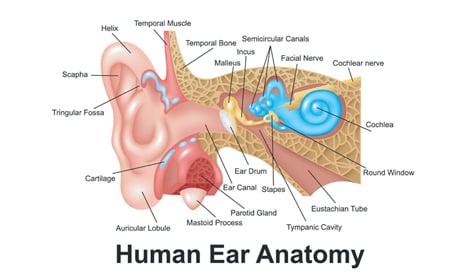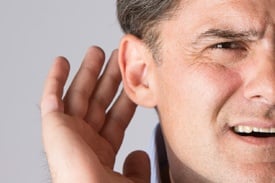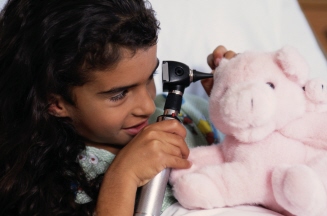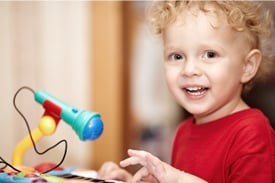Good ear hygiene is often associated with the presence of earwax, commonly known as cerumen. Wax may not be visually pleasing, but it is beneficial to your health. This substance is naturally produced in the ear canal and acts as a protective lubricate against external objects such as dust, dirt, and insects.
Tips for Safely Cleaning Your Child's Ears
Tags: Hearing, Teens, Caregiving, Hearing Loss, toddler, "ears"
Diabetes and Hearing Loss
The number of people in the United States diagnosed with diabetes has risen to more than 50 percent in the last decade. If you’re one of the 30 million Americans with diabetes, take note!
Research indicates that people with diabetes are more than twice as likely to develop hearing loss compared to those without the disease. The rate of hearing loss is 30 percent higher for the 84 million adults in the U.S. who are prediabetic compared to those with normal blood glucose levels.
Tags: Audiology, Hearing, Hearing Loss, "ears"
6 Ways to Use Your Eyes to Help You to Hear
Everyone uses their vision to support their hearing. For example, if we see lightning, we know there will be thunder, or if we see something fall, we know it will make a sound. Even without sound, we can watch a football game and often “see” what an unhappy coach is saying to a player who fumbled the ball.
Tags: Communication, Hearing, Hearing Loss, "ears"
Foods That Help Promote Healthy Hearing
Minerals are in the foods we eat and play a vital role in our overall health and proper body function. Many of us may be aware that calcium builds strong bones and teeth, and that zinc helps with boosting the immune system (think Cold-EEZE cold remedy). There are even some minerals that are critical elements for protecting your hearing health.
Tags: Audiology, Hearing, Hearing Loss Prevention, Hearing Loss, "tinnitus", "ears"
May is Better Hearing & Speech Month
Did you know…
- An estimated 40 million Americans experience speech, language, and/or hearing disorders.
- The second most common reason for special education services in public schools is speech/language impairment.
- 36 million American adults report so
Tags: Speech, Hearing Aid, Audiology, Language, Hearing Aids, Communication, Hearing, reading, literacy, Hearing Loss Prevention, Teens, Support, Caregiving, Hearing Loss, Stuttering, Learning, Voice, toddler, talking, Autism
Earbuds, Music and Your Teen
Today, with the popularity of earbuds and other personal listening devices, it’s hard to know if your child or teenager is listening to music at a safe level. Back in the day, when stereo speakers were common, it was easier for parents to know how loud their children were playing music.
Tags: Audiology, Hearing, Teens, Support, Hearing Loss, "tinnitus"
Why Are My Ears Ringing?
The medical term for the perception of sound when no external sound is present is tinnitus. It is often referred to as “ringing in the ears,” although some people may hear a hissing, roaring, whistling, chirping, or clicking sound. Tinnitus may be constant or intermittent and may occur in both ears or just one.
Tags: Hearing Aid, Audiology, Hearing Loss, "tinnitus"
10 Signs Your Child May Have Hearing Loss
- “Huh? What Did You Say?”
As parents, we all know that hearing and LISTENING are not the same. But, if it seems your child is experiencing hearing issues, even when it appears he/she is listening well, you should ask your child’s physician for an in-office hearing test or referral.
- Failed School Screening
School-aged children routinely have vision and hearing screenings conducted at school. Generally, parents are NOT notified unless there is a concern. If you receive a notice from your child’s school that he/she did not pass the hearing screening, please follow-up as the notice recommends.
- Teacher’s Report— Part I
Let’s face it, teachers spend A LOT of time with our children and are likely the first to notice if your child is experiencing hearing issues. Though, at times, it can be difficult to separate attention/focus from actual hearing ability, if your child’s teacher shares a concern, you should have it checked out.
- Teacher’s Report— Part II
Have you noticed a sudden drop in your child’s grades? Listening can be a tiring task when struggling with hearing. It can be easy for your child to “tune out” the teacher’s lessons, which can then impact his/her grades.
- “Why Is That Television So LOUD?”
Many kids like to raise the volume of the television. For some shows, like cartoons, it can make them seem more exciting and fun, but it could also be a sign that your child is experiencing hearing issues. If your child insists that he/she cannot hear the television at a level that you believe is typical, consider getting your child’s hearing tested.
- “Inside Voice, Please!”
Some hearing problems interfere with our ability to monitor the volume of our own voice. If your child seems to be talking either too loudly (or too softly), consider having his/her hearing checked.
- Recent Upper Respiratory Infection, Colds, Allergies, Flu
Anything that causes swelling in the back of the nose/throat area can cause secondary problems with middle ear health and hearing. Even if there is no fever or pain, your child could still have trouble hearing. If your child recently had a bad cold and, a couple of weeks later, seems to not be hearing well, have it checked.
- “I’m Hearing a Funny Sound!”
If a child reports any unusual noises in their head or ears (a ringing, rushing, roaring, beeping, hissing, etc.), particularly after being exposed to loud sound, have his/her hearing checked.
- Eagle Eyes
Children are marvelously adaptable to using what senses they can to figure out what’s going on and communicate! If you notice that your child seems unusually attentive to visual information and watching the faces of people speaking, have his/her hearing checked.
- “I Thought You Said…”
Does your child seem to mishear or misunderstand what was said? Some hearing problems are subtle and can interfere with hearing certain speech sounds. If this is happening, consider a hearing test.
Tags: Communication, Hearing, Teens, Hearing Loss
7 Tips When Buying Hearing Aids for Children
If your child has been diagnosed with a permanent hearing loss it’s likely that hearing aids have been recommended. Hearing aids can be life-altering for your child, allowing him/her to hear sounds often miss due to hearing loss. Hearing aids that are properly fitted early on can allow your child to develop speech and language skills to reach his/her full potential.
Tags: Hearing Aid, Hearing, Hard of Hearing, Hearing Loss, toddler
How Hearing Loss Affects Speech-Language Development
Children learn to talk by listening to those around them. The first few years of life are a critical time for speech and language development. Children must be able to hear speech clearly in order to learn language. Fluctuating hearing loss due to repeated ear infections might mean the child doesn't hear consistently and may be missing out on critical speech information. Permanent hearing loss will also affect speech and language development, especially if it is not detected early. The earlier hearing loss is identified and treated, the more likely the child will develop speech and language skills on par with children who aren’t experiencing hearing issues.
Tags: Speech, Hearing Aid, Hearing Aids, Communication, Hearing, Deaf, Hard of Hearing, Hearing Loss, Learning, Voice, toddler, talking



















